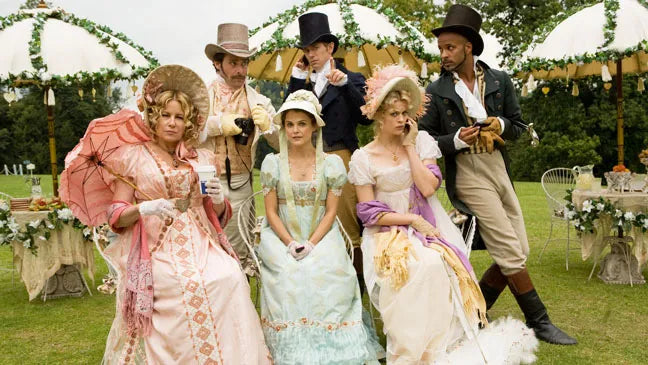While the critics may be fixated on the Oscar snubbing of Greta Gerwig and Margot Robbie, I think the real tragedy occurred on screen.
(Spoiler alerts ahead for those who've yet to see the Barbie movie.)
I didn’t go into the movie expecting to like it, but I found myself enjoying its pink, plasticky aesthetic and quippy observations about womanhood. I mean, who wouldn’t want to float down from the sky and experience magical outfit change after outfit change?
Still, the movie is at its best when it’s exploring a reversal in the power dynamics between the sexes. There are no shortage of girl power movies these days, but it’s rare to see women accepting the mantle of power without accepting at least some vestiges of masculinity. In superhero movies, that might translate into a female character’s superstrength or invulnerability (i.e. Captain Marvel). In legal dramas, that might translate into a female character’s ruthlessness or gamesmanship (i.e. Jessica Pearson in Suits). This is not to say that real women cannot possess these qualities in their own right, but it certainly feels like a sea change to see the hyper feminine in the drivers’ seat.
But different doesn’t necessarily mean better.
Barbie World is painted as a utopia whose fatal flaw is revealed to be that it puts too much pressure on the Barbies to be perfect. The systemic oppression of the Kens is merely a B-Story.
Barbie’s ending is that she becomes a real girl to experience all the joys and sorrows of human existence. Ken’s ending is being gently told to go get a life. Barbie’s halfhearted apology doesn’t count for much when he’s still the butt of the joke. Things are not much better in the macro for Barbie-Ken relations. Black Barbie President, even after recovering from the submission position, is still unwilling to give the Kens equal political representation, which is played yet again, as a joke.
Jokes aren’t always bad, and movies don’t have to be dead serious about every single joke. However, if Barbie the Movie wants to be taken seriously as a cultural reckoning, then let’s treat it like one.
A generous way to interpret the movie’s lack of progress toward Ken-liberation is that it is merely a reflection on the slow pace of social progress in the real world. How could the dominant Barbies conceive of a world where they were perpetrating harm by taking their natural place in the social hierarchy? Except for the fact that this is literally what main Barbie apologizes to Ken for.
And in theory, all the Barbies now understand oppression well enough for the America Ferrera monologue to snap them out of their brainwashing trance. Note that when the other Barbies snap out of this trance, they all speak from a well of grievances much deeper than the two seconds that the Kens have been in power. These Barbies have not experienced real female disempowerment, they were just tricked into being horny French maids for a little while. This part of the movie is clearly addressed directly to the audience rather than the characters within the world they inhabit. We are supposed to be nodding in agreement the whole time. It is hard to be a woman. Isn’t it great when women are in power?
But this world where the women are in power is terrible for the men, from the beginning of the movie to the end. What are we really supposed to be nodding along to? A tacit acceptance that at the end of the day, one of the sexes needs to be marginalized, and isn’t it nice when it isn’t women?
I believe that the reason this sentiment is woven into the movie is because it is a sentiment that has been adopted by mainstream feminism and other social movements. Men have had their turn, and now it’s time for them to step aside because the future is female. But the future is not female, the future is all of us and we should hope that it is more equal for all of us. Men’s historically dominant role doesn’t give us license to belittle the current generation of men. It certainly doesn’t move us toward a more enlightened society. We might also wonder why-on-Earth men would advocate for women’s equality if it were to come at their own expense. Especially when it doesn’t have to.
As we shift the dialogue toward empowerment, men must be included in that conversation. Here at Saturday Box, we are deeply invested in empowering both women and men to feel more comfortable in the bedroom. What is sexually fraught for women is often equally complicated for men, even if it exists in a different context. BDSM, by its very nature, comes with baggage around baked-in power structures. These conflicts can be delicious in the bedroom, but they also have the potential to bother us in ways that we don’t always expect.
As a sexual wellness brand, our goal is to support both partners equally, men and women, dominants and submissives, not only because it’s the right thing to do, but because it takes two to tango. Even though our aesthetic occasionally skews toward Barbie, we are fully committed to building a better world - for both Barbies and Kens.






Share: